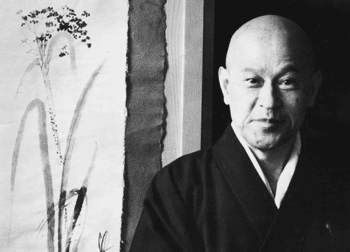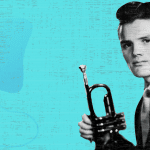In Zen Buddhism there is a concept of the beginner’s mind. To quote Wikipedia: It refers to having an attitude of openness, eagerness, and lack of preconceptions when studying a subject, even when studying at an advanced level, just as a beginner in that subject would.
When we begin studying this music, we’re excited and open, but as we progress, we get caught in all sorts of traps and our beginner’s mind is lost.
An excess of information
The number one problem in advancing at jazz improvisation is the vast amount of excess information today. It should be be the opposite. More information on a subject should make it easier. It’s only logical. But what if that information is wrong? What if that information is only one perspective from an infinite amount of possible perspectives?
I’ve taken lessons with many of my favorite musicians today. What’s interesting is that they all had completely different viewpoints about what was important and they all had different ideas of where I should focus my time. Some of the viewpoints were in direct opposition to each other. Who is right and who is wrong?
Nobody is right or wrong. Each one of their suggestions is simply a reflection of their own concept of the music. It’s up to the student to take suggestions and figure out what to work into their own concept and what to filter out.
Something we’ve attempted to do on this site is share things that we’ve learned from multiple sources. For example, why do we talk about language and transcribing so much? Because every single great player we’ve talked to or studied with spoke about the importance of language and transcribing.
But rather than people deciding what’s important for themselves, the beginner’s mind has been flooded with an excess of information. Information that is leading people astray. Information that quickly sweeps up the beginner’s mind and transforms it into an all-knowing presumptuous machine, where there exists little possibility or creativity.
A process of domestication
Think about the first time you heard jazz. How did you feel? Were you in awe? Were you confused and wanted to know what you were hearing?
Upon first exposure, jazz is a mystery. How are they pulling these notes out of thin air? The music is magical and it transports us to another world. As we study this music, we tend to lose this spark, this energy. The magic evaporates and what’s left is an analytical academic mind, thinking about and judging every little bit of aural data that is processed.
How does this process of domestication start? It begins the second we put our faith into something we see instead of something we hear. Beginner’s are told within the first weeks of approaching jazz, ” You gotta learn the theory.” While this isn’t completely false as the theory can help describe what you are hearing, it’s certainly not as big of a deal as it’s made out to be and the “theory” that one is instructed to learn is hardly music theory, but more of a system for how to play jazz.
If you want to actually study music theory, study the works of any of the great classical composers: Brahms, Beethoven, Bach…or read theory and composition books by classic composers such as Schoenberg’s book on the Theory of Harmony or his book on Musical Composition. I warn you, they’re dense, but thorough.
Understand that “Jazz theory” is a term coined for a system that is supposed to aid in playing jazz. Is this system effective? We’ve written at length describing this system and why it doesn’t work. Here’s just a few articles to explore:
- Jazz education blunders
- Scales are not the secret
- Turning jazz rules into tools of expression
- What transcribing really is
If this jazz-theory-system were effective you wouldn’t be reading this right now, you probably would never have heard of this site, you wouldn’t be looking for more advice, wondering where this system has left you hanging out to dry. You know the model is incomplete; I say incomplete because of course there is some merit in it, it’s simply a small portion of what you could study and it’s filtered through many secondary sources, the primary sources being recordings…nonetheless, you still accept it. You accept it because that is what is taught in books and by many teachers, so it must be correct.
Five years later, you’ve got 125 Aebersolds, every instructional book on the market, and a dozen real-books, yet playing over a blues is still difficult.
Once we get to this period in our development where we’ve spent ample time learning the standard model, we think we’re advanced. We can talk about altered scales, tritone substitution, Giant Steps superimpositions…so we conclude, we know this stuff pretty well.
Our beginner’s mind is long gone. We’ve got it all figured out.
Returning to a beginner’s mind
“In the beginner’s mind there are many possibilities, in the expert’s mind there are few.” – Shunryu Suzuki
What I previously described in the process of domestication is definitely an extreme. Hopefully, your personal musical situation is not that dire. I am familiar, however, with this extreme situation because at one point years ago I felt I was heading down that track. This is how I know that this common situation is prevalent, and this is how I also know that anyone can escape it if they desire.
Each time we approach a musical problem, we have the opportunity to proceed with a beginner’s mind, as if we’re approaching it for the first time. This doesn’t mean you throw all you’ve ever learned and studied to the wind. It means that you have an open-mind, expressing curiosity for other possibilities. That the solutions you presently know or the common solutions presented, may be flawed, or that there exist other solutions that would be closer to your musical ideal.
We often forget that our goal should be to get closer to our own personal musical ideal. To do this, prescribing to any method other than our own will automatically put us on the wrong track. The bulk of the jazz education resources available today convey one simple method to approach improvisation, all based on the application of scales to chords (see the links presented earlier in this article). We blindly accept this model and get frustrated when we are not moving in the direction of our musical ideal.
This model fills our head with one particular way to approach everything and ingrains insufficient mental images and sounds of the jazz repertoire into our mind. For instance, I’ll bet for most of you, like me, your first exposure to the tune Have You Met Miss Jones was through a play-along track. This version of the tune spoils your beginner’s mind. That version of the tune becomes an entity in your mind from there on out and unless you change it, that’s it.
But, you could choose to have a beginner’s mind toward this tune and think, “There must exist other possibilities for this tune,” and perhaps you stumble upon Art Tatum displaying a pure masterpiece.
The truth is, no matter how far we get, there are new and exciting things to learn. No matter how advanced you think you are or conversely, how lost you may be, returning to a beginner’s mind will not only expand your mind, but your ear as well. A world of possibilities awaits you.











